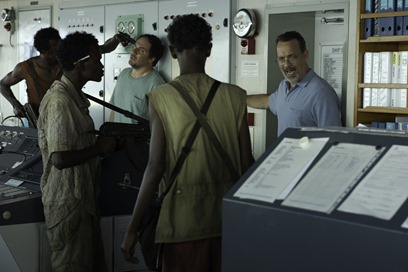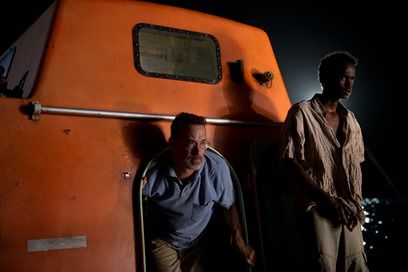Most movies that bill themselves as ‘Based of a True Story’ tend to have the barest connection to actual events. Captain Phillips is not one of those films.
In 2009, a ship captained by Richard Phillips was boarded by Somali pirates. Phillips wound up being kidnapped for ransom and only the intervention of the U.S. Navy kept his story from being unhappily ever after. Captain Phillips shows that story in an unflinching and frequently terrifying manner.
The movie opens with Phillips (Tom Hanks) preparing to set out on another voyage, captaining the Maersk Alabama past Somalia and around the horn of Africa. He and his wife Andrea (Catherine Keener) spend the drive to the airport talking about mundane, day-to-day stuff – their daughter is at college, their son is soon to follow, if he gets his head together and focuses. It’s just another day and Phillips is off to just another job.
Then we get to see Somali villagers preparing to head out to sea in shockingly small skiffs, with hijacking a ship for a huge ransom in mind. It’s a job for them – for many the sole opportunity to make a living. One skiff is commanding by Muse (Barkhad Abdi), who puts together a group that includes a tall, quiet type, a mechanically-inclined guy and a kid who’s on his first job.
Things go sideways for the Alabama when his ship is approached by skiffs with armed pirates just outside Somali waters. They manage to dissuade one by increasing speed and buffeting it in their wake, and setting up a shield of pouring water using firehoses. But Muse’s skiff cannot be shaken and, eventually, the pirates find a breach and clamber aboard. Soon, they kidnap Phillips and set out in the ship’s lifeboat, their skiff having drifted away.
Paul Greengrass takes the story of Captain Phillips – a story that was already well known (it was in the news for a considerable period) and makes it fresh with his usual documentary style of shooting. The camera moves around from character to character and skiff to ship in an increasingly frenetic manner – though to be fair, he does tone the pace down considerably from what we saw in his Bourne movies.
Despite knowing what happens, the taut script (by Billy Ray, based on “A Captain’s Duty: Somali Pirates, Navy SEALS, and Dangerous Days at Sea” by Richards and Stephan Talty) and singular performances by Hanks and Abdi combined with Greensgrass’ distinctive style keep us on the edge of our seats throughout.
There’s a moment that encapsulates the film when Muse brags about his last job making six million dollars and Phillips asks why that job didn’t set him up for life. Muse replies, ‘I got bosses’ – to which Phillips replies, ‘We’ve all got bosses.’ Despite all their differences – background, education, hell, their entire lives – they have that one thing in common. It’s a sobering revelation.
Sure there are things bubbling beneath the film – the effect of globalization and worldwide access to communication; the societal differences between America and the Third World, and so much more – but Captain Phillip boils all these themes down to two guys trying to do their jobs.
Ultimately, the Navy and a SEAL team get involved and there’s the expected explosive resolution that we all know – despite the adrenalin pumping through our bodies – is coming. And this is where all the adrenalinized desires to whoop and cheer get subverted. This is when we see the toll the experience has had on Phillips. This is where Hanks elevates his game even beyond his Oscar®-winning work on Philadelphia.
Yes, we know the story – the story that got reported. We don’t know so much more – and Captain Phillips lets us catch a glimmer of that. In doing so, it elevates us and that’s the mark of a truly great film.
Final Grade: A+
Photos by Hopper Stone/Courtesy of Columbia Pictures

